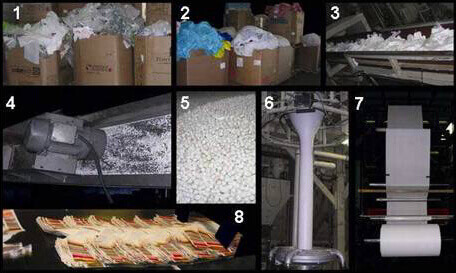Greening America: When Science Goes Bad
by Robby Meadows
The title of my article sounds like one of those Gary Larson cartoons where the dinosaurs are sitting around smoking cigarettes and the caption reads “How dinosaurs really went extinct”. But there has been a lot of loose facts and figures floating around and its time I shared our position on it.
Science is for the majority based on fact, observation over time, analysis and documented study and like any set of facts they can be twisted to almost any end. Take the di-hydrogen monoxide story example:
The major component in foam cups is everywhere now…
Di-hydrogen Monoxide is colorless, tasteless, and deadly if inhaled. It is used in the manufacture of foam cups. Its basis is the highly reactive hydroxyl radical, a radical shown to mutate DNA, denature proteins, disrupt cell membranes, and chemically alter critical neurotransmitters. The atomic components of DHMO are found in a number of caustic, explosive and poisonous compounds such as Sulfuric Acid, Nitroglycerine and Ethyl Alcohol.
Oh… did I forget to mention that the chemical abbreviation for Di-Hydrogen Monoxide is H2O? Yes, it is just plain water! Makes me want to add some C2H5OH (the intoxicating component in Tennessee whiskey) to mine and relax as I think about more science gone bad.
The great plastic bag scam.
Recently we have seen/heard of bans on plastic bags even in China. Look at the science and do the math, plastic bags are really not the problem…we are. Thin t-shirt style plastic bags hanging from tree branches or blowing across I-5 in California on a hot summers day are easy to hate. So stop and ask…”how did those bags get there”? The problem is social not chemical, people being careless have created this problem, but people unlike physics can change. We are already doing so without the mandate of government.
If plastic is so bad, why is it OK to make bags using more of it?
This is the approach of most governments to get rid of the thin bags only to use more resources and make the bags thicker. The concept is “reusability”. It is a good concept but based on bad science. Plastics are the easiest to recycle and take less direct energy than any other substrate there is…period. I have literally watched plastic bags being recycled in a small machine and 45 minutes later I watched that same plastic being made into new bags.
Plastic Bags are easy and efficient to recycle.
Here is how it is being done right now for Nashville Wraps Products:
- Collect recycled material from local businesses and from consumer sources.
- Sort recycled material from manufacturing waste.
- Recycling plastic minimizes waste and down-cycling.
- Produce pellets from recycled material.
- Mix recycled material (pellets) into extruder.
- Create new plastic film.
- Create new plastic bags made with recycled material collected and made in the U.S.A.
Also see the blog article: Plastic Bags are easiest to recycle
The polyethylene (PE) t-shirt bags that Nashville Wraps distributes are made with an additive that causes the bags to chemically oxidize to lower and lower molecular weights, become brittle and micro fragment. The fragments are then ingested slowly by microorganisms, ultimately leaving carbon dioxide, water and biomass. Additionally our Encore TM T-sacks are made from an average of 10% Post Consumer recycled plastics (in part bags that were picked up off the beach) and anywhere between 15% and 90% of post industrial recycled plastics. As of this writing all of our domestic plastic bags are made from a minimum of 25% recycled plastics.
Even now new additives are available that actually help the PE molecules bio-degrade. This biodegradation process can take place aerobically and anaerobically. It can take place with or without the presence of light. These factors promote biodegradation even in landfill conditions which are normally not conducive to any biodegradation.
In short, we have solved the science of plastic bags
The rest is up to us as a society. I personally think that we are already becoming more and more aware of the smallest of things like tossing out a bag. As a free and intelligent people we will fix our own problems, change and adjust as we need to and do not need our local governments thinking for us.
Resources:
ECM Biodegradable additives: ECM Products Overview
Recycled Plastic Bags: Recycled Plastic Bags at Nashville Wraps

